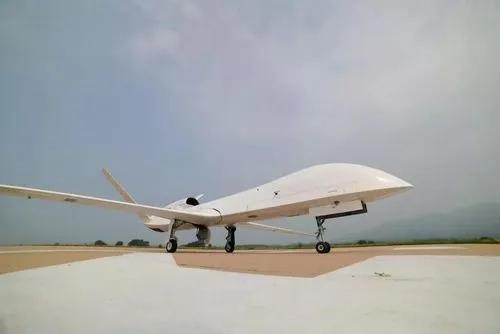Algeria has recently bolstered its military capabilities by acquiring four state-of-the-art WJ-700 Falcon unmanned aerial vehicles (UAVs) from China Aerospace Science and Industry Corp (CASIC), a leading Chinese state-owned enterprise. This strategic move, announced by the Algerian resource ORCA Military on March 13, signifies a significant advancement in Algeria’s reconnaissance and combat operations.
The WJ-700 Falcon UAVs, which are currently undergoing final acceptance tests, are expected to be operational in the near future. These UAVs are part of the High-Altitude Long Endurance (HALE) class, capable of engaging targets up to 100 km away with missile strikes and air target neutralization. The procurement of these UAVs comes amidst Algeria’s ongoing regional tensions with Morocco, which has also been upgrading its military assets.
Developed by Beijing Haiying General Aviation Equipment, a division of CASIC, the WJ-700 was first unveiled at Airshow China 2018 and took to the skies on its maiden flight in January 2021. Designed for high-altitude, high-speed operations, the WJ-700 boasts a significant payload capacity and the ability to deploy large-caliber ammunition beyond the reach of enemy air defenses. CASIC envisions the WJ-700 serving both domestic and international markets over the next decade.
A notable aspect of the WJ-700 is its size, which enables it to carry substantial payloads, including anti-ship missiles, positioning it as a formidable asset against tactical and strategic targets such as radar installations, warships, and command centers. The UAV’s specifications, as revealed at the Zhuhai Aerospace Salon in 2018, include a maximum take-off weight of 3,500 kg, a payload capacity exceeding 800 kg, a flight duration of up to 20 hours, and an operational ceiling of 15 km. Powered by a turbojet engine, the WJ-700 can reach speeds nearing 700 km/h and is equipped with electronic countermeasures for enhanced survivability.
The People’s Liberation Army (PLA) Information Department projects that by 2024, Chinese military UAV sales will constitute approximately 25% of the global market, translating to 17 billion yuan ($2.6 billion). Over the next decade, revenues from Chinese military UAV sales are anticipated to surpass 110 billion yuan (about $16.8 billion).
Algeria’s existing UAV fleet includes the CASC CH-4 and CH-3, both Chinese-made and capable of deploying various munitions, notably the AR-1 Precision Guided Missile (PGM), widely used across Africa. Additionally, Algeria is set to become the first North African nation to deploy the Aksungur UAV, having ordered six units from Turkey. The Aksungur, designed by Turkish Aerospace International (TAI), is a medium-altitude, long-endurance UAV with a substantial payload capacity, making it well-suited for intelligence, surveillance, reconnaissance (ISR), and attack missions.
Furthermore, Algeria has placed an order for ten Anka-S drones from TAI, mirroring the export success of its Turkish counterpart, the Bayraktar TB2, in Africa. The Anka-S and Aksungur UAVs represent a significant enhancement to Algeria’s aerial warfare capabilities, reflecting the country’s commitment to maintaining a robust and technologically advanced defense infrastructure.




